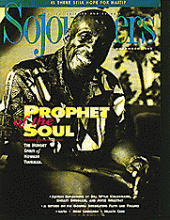The story of the relationship of Euro-Western biblical scholarship to the plight of a people of African descent in North America is in many ways a sad and sordid tale. Biblical interpretations produced in the matrix of Euro-Western cultural and ideological domination have often justified and even facilitated the horrors of violent exploitation and subjugation that have characterized African peoples' collective sojourn in America.
Well-known and lesser known examples are numerous of the use of the Bible to legitimize oppression. The near exclusion of African Americans and their perspectives from Euro-American biblical academies has helped to maintain a Euro-Western hegemony in North American biblical studies, producing just such translational and interpretive travesties. (As of this writing, there are less than 35 African-American biblical scholars who, collectively, constitute just one-fifth of one percent of all North American biblical scholars with doctorates.)
Stony the Road We Trod, which is the collective effort of 11 of these African-American biblical scholars, is the first such joint work to appear. It was written to contest the Euro-Western hegemony in biblical studies that has proven to be anathema to the interests of African Americans. In this sense, the book is a contemporary resistance text. While its overall tone is impassioned, it is not an exercise in polemics or stridency. Rather, its 11 studies are works of responsible and studied biblical scholarship.
Cain Hope Felder's introduction sets the almost religiously zealous tone of struggle against racist Euro-American domination of biblical studies that permeates the book. He relates anecdotes from the authors (without attribution) about their struggles as African Americans in general and African-American biblical scholars in particular, including one contributor's account of being a near-victim of a lynch mob in his youth.
Read the Full Article

